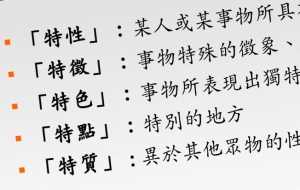 Learning to speak Chinese is likely the main reason students want a teacher. This doesn’t mean that finding a good teacher to practise speaking with is easy, nor that all teachers actually focus on speaking during speaking lessons. This article will discuss what to look for when finding a teacher, some common problems you may encounter and what to do about them, as well as some suggestions for more advanced learners.
Learning to speak Chinese is likely the main reason students want a teacher. This doesn’t mean that finding a good teacher to practise speaking with is easy, nor that all teachers actually focus on speaking during speaking lessons. This article will discuss what to look for when finding a teacher, some common problems you may encounter and what to do about them, as well as some suggestions for more advanced learners.
Before we discuss what can be done to maximise what you get out of a speaking lesson, we need to recap the most important parts from the first article in this series. If you haven’t read it yet, I suggest that you do so before reading on. For those who have read it and merely want a summary, here are some things to keep in mind:
- Know what you want – Most of the things I’m going to say in this article about speaking ability depends on what your goals are. Without being clear about that yourself, there is no way you can tell your teacher and therefore it’s impossible for her to adjust. If you don’t know what you want, either figure this out first or explore it with your teacher. After all, if you just know that you want to improve your Chinese, it’s a great idea to ask your teacher what she thinks is your weakest link and work on that. Note that figuring out what your weakest link is also a clear goal in itself.
- You reap what you sow – Language lessons can be the fastest way to fluency, but they can also be a waste of time and money. Which one it is does depends on the teacher, but it depends on your own efforts even more. If you go well-prepared to each lesson, with an open mind and do your very best in class, then review properly afterwards and practise things that have come up during the lessons, you’re more likely to benefit than if you don’t. As some people say, languages cannot be taught, they can only be learnt. The teacher is there to facilitate and guide your learning; not even the best teacher can’t do it for you.
The previous article also contains a discussion about why it can be beneficial to have a teacher, what you should look for in teachers in general and so on, but I will not repeat that here, but will instead refer to an index of all the articles in this series:
- Training your Chinese teacher, part 1: Introduction
- Training your Chinese teacher, part 2: Speaking ability (this article)
- Training your Chinese teacher, part 3: Listening ability
- Training your Chinese teacher, part 4: Writing ability
- Training your Chinese teacher, part 5: Reading ability
- Training your Chinese teacher, part 6: Characters, vocabulary and grammar
Are you ready for a speaking lesson?
Yes, you are. Skilled teachers can have conversations with complete beginners, even if it can be very demanding both for the teacher and the student, especially if no other language than Chinese is involved. If some English is allowed, the tension decreases and most students except the most anxious should be okay.
If you don’t feel ready for your first speaking lesson (even though you probably are), you can build some confidence by listening more, because not understanding what’s going on can kill confidence quickly. For suggestions regarding what to listen to, check out this post. Additionally, learning some vocabulary and phrases that will be useful during the lesson can also help. This involves things like:
- How do you say X in Chinese?
- What does that mean?
- Can you please say that again?
Read this article for more about learning Chinese in Chinese.
You are ready, though! A good teacher will be able to adapt to your level and there’s really nothing to fear. The only case where you might not actually be ready is if you’re enrolling in a formal class with other students at a level much higher than your own, but even that can be done.
Finding the right teacher
Finding a good teacher you work well with is not easy. Before you start applying the advice offered both in the previous article and this one, you should make a serious effort to find a teacher that is already quite good. While you can influence the way most teachers teach, especially if you’re the only student, it’s exceeding difficult to change someone’s basic approach to teaching, let alone their personality or attitude.
Therefore, you need to try as many teachers as you can. If you’re looking for online tutoring, this is very easy! This is indeed one of the main benefits of online language learning. If you’re looking for a teacher locally, you probably need to lower your standards a bit (depending on where you live). Regardless, try several teachers before you decide.
 After having a lesson, ask yourself these questions:
After having a lesson, ask yourself these questions:
- Did the teacher adjust the content based on my expressed goals?
- Did the teacher make me feel confident to try new things?
- Did the teacher adjust her language to my level?
- Did the teacher use mostly words I know?
- Was the teacher patient and repeated or rephrased until I understood?
- Was the teacher patient and let me speak even if I needed time to think?
- Did the teacher resort to English only occasionally when really necessary?
- Did I get along well with the teacher?
The importance of some of these questions depends on your goals. For example, if you want a teacher to explain how Chinese characters work as a beginner, you are going to need some English. This is okay. If your only goal is to improve your conversational Mandarin, though, there’s no need to use English much at all.
The answer to as many of the above questions as possible should be “yes”. The more teachers you have to choose from, the more picky you can be, of course. The most important thing is that you feel motivated to learn and that you spend the lesson practising what you want, in this case speaking.
Common problems with speaking lessons and what to do about them
Here are some common problems with lessons meant to improve your speaking ability. Please note that these are of course only relevant when the expressed goal is to improve your speaking ability, and that some of them might be desirable when the goal is something else, such as improving your understanding of grammar, difficult words or something else. As I’ve said a couple of times already, your goals are very important!
- Problem 1: The teacher introduces too many new things – This is a common problem and almost all but the most experienced teachers are guilty of it. It’s not necessarily because they think you should learn all those words or think that learning a new grammar pattern is more important than speaking, it’s just that they either don’t know how hard it is to handle all these new things for the student (if the teacher is a native speaker) or that they have forgotten how hard it was (if the teacher is an advanced second language learner). Explaining a new word or pattern is also easier than figuring out clever ways to use only words you know, so it’s an escape hatch for stressed teachers as well. If your goal is to improve speaking ability, though, there should be a minimum of new words and grammar patterns; only truly egregious gaps in your knowledge should be filled during the lesson.Solution: Focus as much as possible on what you already know. Let the teacher know that you are already learning so many words and that you probably can’t learn any more right now. Tell her you want to master the words you’ve already learnt instead. Naturally, it takes a teacher some time to adjust to your level and get to know which words you know and which you don’t, so you have to be patient here. However, it’s easy to tell when a teacher just throws in a new words because she thinks you might need it some day, and when she does it because she mistakenly thought you knew it already. The former is a problem; the latter is not.
- Problem 2: The teacher corrects me on one thing, then when I try to fix it, she corrects something entirely different. This is a problem not limited to language learning. It’s also something that have bothered me for a long time (indeed, one of the earlier articles here on Hacking Chinese is about this topic). The problem is that the human mind is very limited when it comes to attention, and most people simply can’t maintain focus on too many things at once. If you make a tone mistake and the teacher points it out, you’re more likely to make other types of mistakes if you focus very hard on not making that tone mistake.Solution: This problem is hard to solve. I’ve been irritated by this for at least a decade, and I still find myself doing it to students occasionally, although I would like to think I’ve become better at avoiding it. The solution is to to persist and focus on one issue at a time and only switch focus once you’ve made significant progress. As a student, you should always repeat what your teacher says when she corrects you, and make sure you get it right. Some teachers don’t like telling you to your face that you got it wrong the tenth time too, but it’s sometimes possible to sense this anyway. If your teacher corrects you on something else while you’re focusing on her previous correction, just say that you think it’s really important to fix that problem first.
- Problem 3: The teacher speaks too much English – This is a well-known and much-debated problem. If your goal is to improve your conversational ability, most of the lesson, if not all, should be in Chinese, with only occasional pointers and clarifications in English. Teachers and students use English for a variety of reasons, but I think the dominant one is that it’s easier and removes friction. Some teachers have also invested an awful amount of time in learning English and might feel cheated if they don’t get to use it. How much English is too much, then? That’s hard to specify, but the American Council on the Teaching of Foreign Languages (ACTFL) recommends 95% target language, which seems like a good ball-park number.Solution: If you’re a beginner, this means that you need to learn classroom language first, i.e. language necessary to learn Chinese in Chinese (see above about being ready). If you find your teacher or yourself saying the same things in English many times, stop and learn how to say those things in Chinese instead. For all learners, not just beginners, imposing a no-English rule can help. If you’re confident enough to use only Chinese for an hour-long lesson, then do that, but for most students, I suggest setting a much more limited time. Agree with your teacher to spend the first ten or twenty minutes of the lesson only in Chinese, then go back after than and clarify things if necessary.
 Problem 4: The teacher speaks too much – This is less straightforward than the others on this list. It could be argued (and many teachers and researches do argue) that language is mostly acquired through meaningful input (see this article about comprehension-based language learning and teaching, for example), and that speaking yourself is merely the result of learning, not the cause of learning. On the other hand, speaking is definitely a skill you need to practise, since retrieving vocabulary, piecing together sentences and so on gets easier the more you speak. Personally, I think the answer lies somewhere in between. If your teacher speaks almost all the time, it could still be valuable, but it might not improve your speaking much in the short term. If you speak all the time, you don’t really need a teacher, you could just speak with yourself (that’s not a joke, by the way).Solution: It’s hard to find a blanket solution for this problem since it can have many causes, but start by trying to speak more yourself and see what happens. Prepare more before lessons to feel more confident if that’s an issue. If you end up in a struggle for opportunities to speak, you should probably find another teacher. However, in my experience, most teachers speak a lot because the students don’t and it’s awkward when no-one says anything.
Problem 4: The teacher speaks too much – This is less straightforward than the others on this list. It could be argued (and many teachers and researches do argue) that language is mostly acquired through meaningful input (see this article about comprehension-based language learning and teaching, for example), and that speaking yourself is merely the result of learning, not the cause of learning. On the other hand, speaking is definitely a skill you need to practise, since retrieving vocabulary, piecing together sentences and so on gets easier the more you speak. Personally, I think the answer lies somewhere in between. If your teacher speaks almost all the time, it could still be valuable, but it might not improve your speaking much in the short term. If you speak all the time, you don’t really need a teacher, you could just speak with yourself (that’s not a joke, by the way).Solution: It’s hard to find a blanket solution for this problem since it can have many causes, but start by trying to speak more yourself and see what happens. Prepare more before lessons to feel more confident if that’s an issue. If you end up in a struggle for opportunities to speak, you should probably find another teacher. However, in my experience, most teachers speak a lot because the students don’t and it’s awkward when no-one says anything.- Problem 5: The speaking lesson is just like a normal lesson – This has happened to me many times in formal educational settings. It says “speaking” or “conversation” on the schedule, but it’s actually just like the normal lessons. You go through a new text, new words and new grammar, and so on. If your goal with having a teacher is to improve your speaking ability, you’re likely wasting your time here; I even switched language schools for this very reason once.Solution: Since this problem is clearly caused by a misalignment of goals, you need to clarify what you want and the teacher or school needs to clarify what they can offer. If you’re the only student, any competent teacher should be able to adjust the content of their lessons to your goals. Tell your teacher you would prefer to just talk and not study any new material. The below suggestion about talking about a prepared topic also works.
- Problem 6: Speaking practice consists of reading scripted dialogues in a book – This is probably a practice inherited from older language teaching methods that don’t include much creativity and/or communication. Reading scripted dialogues aloud can be useful for several reasons, including pronunciation practice, learning and contextualising new words and grammar patterns and so on, but it doesn’t really improve your speaking ability that much, except indirectly.Solution: Start with a familiar topic (which could be the dialogue mentioned above) and talk about it instead. Talking about a known topic ensures that you know enough words to actually talk about it. For beginners, this still requires the teacher to take the initiative, perhaps by asking questions about the dialogue. This might look boring when when written down here, but actually works exceptionally well in real teaching situations. For example, if one line says 小王昨天买了三本书, the teacher can then ask about each element of the sentence, starting with closed yes-no questions (小王昨天买书吗?) and gradually gearing up to more open questions (小王昨天买什么?).
Additional considerations for more advanced learners
Most of the above advice is applicable to all students, but here are some suggestions specifically for more advanced learners.
- Ask for more honest feedback – If you can already speak Chinese at a conversational level, you probably don’t need a teacher to just speak, but you do need a teacher to spot your problems and correct your errors. Thus, finding a teacher who can do this is important! You’re unlikely to be able to train your teacher in this regard, though, but at least be explicit and tell the teacher that you want honest feedback.
- Ask for stricter feedback – When teaching beginners, teachers typically don’t aim for perfection, but let the students continue when they have reached an acceptable level. If you are at a level where you not only want the other person to understand, but you also want to use idiomatic Mandarin, you need to tell your teacher. They might be used to a much lower standard, so telling them to raise the standard is a good start. You will likely need to remind them of this occasionally.
- Explore alternative paths – There are many ways of saying the same thing in any language. You can actually get very far with being able to say something in just one way, as long as you can also understand other ways of saying it. If you want to take your spoken Chinese to the next level, try spending time with a teacher to explore these other ways of saying things you already know how to say. Paraphrase, rephrase or simply experiment more under the guidance of your teacher.
- Explore new topics – To widen your horizons, agree on a specific topic in advance and discuss it with your teacher during the lesson. This could be a topic related to your job or field of study, and can be based on written materials (you can agree to both read an article about an interesting topic and discuss it during the lesson). This is good because you can prepare and learn necessary vocabulary beforehand, which means that the lesson is well-spent using these words, rather than hearing them for the first time.
 Sort out nuances – One of the hardest parts of learning Chinese on your own is to sort out small differences in meaning, say between near-synonyms or grammar patterns that seem to mean the same thing. Although I have written an article about how to deal with this problem, the truth is that the most effective way to approach it is to go through the trickiest problems with your teacher. Keeping a notebook is great; otherwise you’ll forget most of the really interesting questions. Please note that you need to be at a very advanced level before most of these minor differences matter!
Sort out nuances – One of the hardest parts of learning Chinese on your own is to sort out small differences in meaning, say between near-synonyms or grammar patterns that seem to mean the same thing. Although I have written an article about how to deal with this problem, the truth is that the most effective way to approach it is to go through the trickiest problems with your teacher. Keeping a notebook is great; otherwise you’ll forget most of the really interesting questions. Please note that you need to be at a very advanced level before most of these minor differences matter!
What speaking with a good teacher can be like
Learning to speak Chinese with a good teacher is very demanding, sometimes even exhausting, but it’s also encouraging, fun and rewarding. As I said in the introduction to this series, it’s not likely that you’ll be able to upgrade your teacher over night just by highlighting a few issues. My hope is that you can use this article not only for improving the quality of your speaking lessons, but also for advice regarding what to look for in a teacher.
What do you prefer?
This article series is based on my own experience learning and teaching Chinese, discussions with hundreds of other students and teachers, as well as plenty of reading and research. However, there are many problems I haven’t encountered, or there might be important details I have missed.
What do you think? What makes a really good teacher for speaking practice? Do you have any suggestions for other students looking for such a teacher? Have you encountered problems I haven’t discussed here? Leave a comment below!
References and further reading
Littlewood, W., & Yu, B. (2011). First language and target language in the foreign language classroom. Language teaching, 44(1), 64.

Tips and tricks for how to learn Chinese directly in your inbox
I've been learning and teaching Chinese for more than a decade. My goal is to help you find a way of learning that works for you. Sign up to my newsletter for a 7-day crash course in how to learn, as well as weekly ideas for how to improve your learning!